 Salicylic Acid Peel
Salicylic Acid Peel5 Over-The-Counter Acne Ingredients That Really Work
The AEDITION asked top dermatologists to break down the most effective over-the-counter skincare ingredients to treat and prevent all types of acne.
Whether you’re faced with a stress-related pimple, nose full of blackheads, or jawline dotted with cystic acne, clearer skin is the ultimate goal. You can have an arsenal of acne-fighting products in your vanity, but if you don’t use the right ingredient for your specific type of acne, you can be doing more harm than good. We spoke with top dermatologists to understand how and when to use the best over-the-counter ingredients on the market.
Over-the-Counter Acne Treatments
We often think of acne as a beauty issue, but it’s important to treat it as a medical skin condition. Acne manifests on a spectrum ranging from mild congestion of the pores (think: non-inflammatory whiteheads and blackheads) to inflamed pimples, cysts, and nodules. While over-the-counter ingredients can both treat and prevent many kinds of breakouts, the latter end of that spectrum often warrants professional care to avoid scarring, as well as physical and psychological discomfort.
“Acne can be very complex,” says Nikhil Dhingra, MD, a board certified dermatologist at Spring Street Dermatology in New York City. “You have to decide what type of breakouts you’re experiencing. If it’s not clear, then you’re better off working with a dermatologist to figure out what treatments — over-the-counter or otherwise — are appropriate for the type of acne you’re experiencing.”
While it's easier said than done, it's better to prevent acne than treat it. For those prone to breakouts, a daily acne-fighting skincare regimen can be much more effective than relying on spot treatments. “When it comes to spot treatments, you’re treating acne after it’s already reared up its ugly head, instead of preventing pimples from forming,” says Dendy Engelman, MD, a New York City-based board certified dermatologist. “In essence, you’re always playing catch up with your skin.” Her recommendation:
- A double-cleansing ritual using a gentle oil-based cleanser to break down makeup and grime, followed by a cream cleanser to rid residual makeup and sebum
- A serum or acne treatment
- A moisturizer with an oil-free SPF on top
When it comes to over-the-counter acne products, the general rule is for oily and congested (think: prone to whiteheads and blackheads) skin types to use acid- or retinoid-based formulations. For those dealing with inflamed, red pimples or pus bumps, retinoids and antibacterials like benzoyl peroxide are the way to go. Regardless of your condition, patience is the key to success. Once on an anti-acne regimen, give it three months to prove itself. If it’s not working, then it’s time to see your dermatologist.
Over-the-Counter Ingredients to Treat Acne
With the above guidelines in mind, here are the top five OTC acne ingredients that really work.
1. The Ingredient: Salicylic Acid
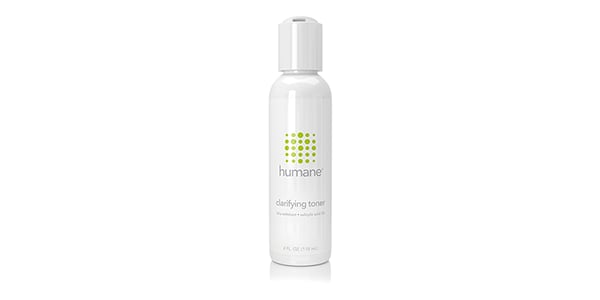
Best For: Whiteheads and Blackheads How It Works: Salicylic acid is a gently exfoliating acid that has antibacterial and anti-comedogenic properties to help regulate cellular turnover, unclog pores, and prevent build up that may lead to acne and inflammation. “It’s also a keratolytic, meaning it dissolves keratin, which allows it to penetrate into the skin and prevent pores from becoming congested,” Dr. Engelman explains. OTC Recommendation: She likes the Humane Clarifying Toner. Use it once a day after cleansing and before moisturizing.
2. The Ingredient: Benzoyl Peroxide
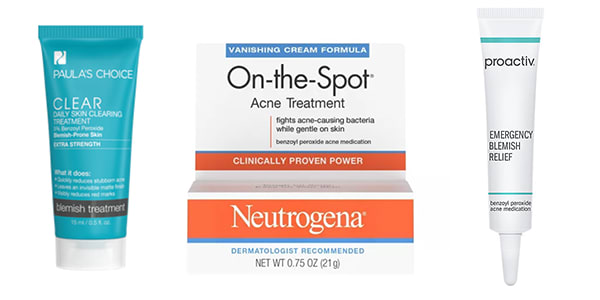
Best For: Inflamed or pus-filled pimples; in some cases, cystic acne How It Works: Benzoyl peroxide is an antimicrobial, meaning it helps to destroy acne-causing bacteria. It also helps to decrease inflammation and keep pores clean over time. It’s one of the most tried-and-true ingredients used to fight acne. OTC Recommendation: Over-the-counter benzoyl peroxide can be found at 10 percent potency, but dermatologists recommend starting slowly with 2.5 percent or 5 percent in order to avoid irritation. We like Paula’s Choice Daily Skin Clearing Treatment as an all over lotion. For a spot treatment, we like Neutrogena On-The-Spot Acne Treatment and Proactiv Emergency Blemish Relief, which contain 5 percent benzoyl peroxide.
3. The Ingredient: Tea Tree Oil
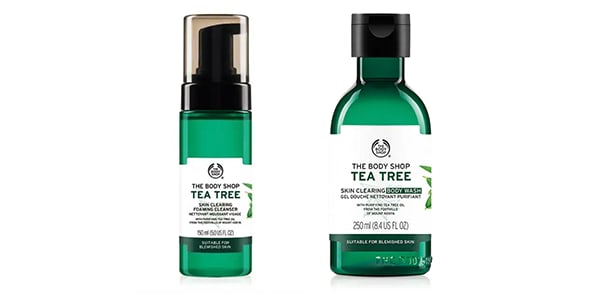
Best For: Mild to moderate acne How It Works: This all-natural oil is extracted from a tree native to Australia known as the Melaleuca alternifolia. Studies show that it naturally contains antibacterial and anti-inflammatory properties. Because of this, it can treat a wide range of acne from whiteheads and blackheads to inflamed pimples. Unlike other acne ingredients — which tend to have side effects of dryness and irritation — tea tree oil is moisturizing. OTC Recommendation: Whatever you do, don’t dig into your collection of essential oils and apply tea tree oil directly to your skin. It can cause severe irritation. Instead, dampen a cotton ball with water and add a drop of tea tree oil to use as a toner or spot treatment. It’s also safe to use a product that contains tea tree oil in it, like The Body ShopClearing Foaming Cleanser or Tea Tree Skin Clearing Body Wash.
4. The Ingredient: Vitamin A Derivatives
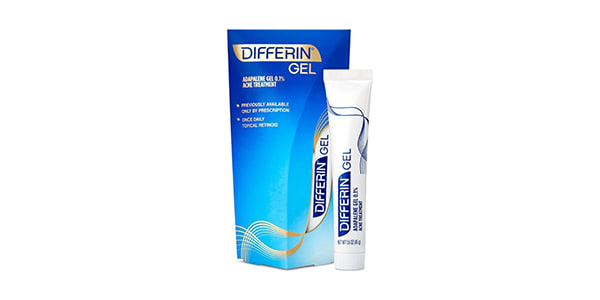
Best For: Moderate to severe acne, including cystic
How It Works: Retinoids have become the go-to vitamin A derivative for stimulating cellular turnover. Not only do they exfoliate the skin and boost collagen production, they also help to break the cycle of acne by keeping the pores unclogged.
OTC Recommendation: Dr. Dhingra recommends starting with Differin Gel, which the U.S. Food and Drug Administration (FDA) approved for over-the-counter use in 2016. Since it only contains 1 percent adapalene, it’s safe and effective for all skin types. “If you’re getting scarring or predominantly painful, red, pus-filled bumps, you’re better off getting a prescription from a dermatologist, as adapalene can be too mild to be thoroughly effective,” he cautions.
5. The Ingredient: Sulfur
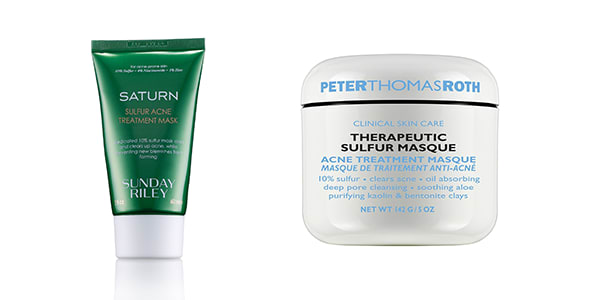
Best For: Inflamed acne How It Works: Sulfur is a popular ingredient used to treat all types of skin inflammation. When it comes to acne, it’s a gentle yet effective ingredient used to reduce swelling and is “particularly effective for patients doing medical-grade acne treatments,” Dr. Dhingra says. These patients often have cystic acne and use OTC products with sulfur to help treat their condition. OTC Recommendation: Try using a mask like Sunday Riley Saturn Sulfur Acne Treatment Mask or Peter Thomas Roth Therapeutic Sulfur Mask once per week.
The Takeaway
Acne comes with many complexities and nuances to diagnose and manage, but there is a lot that can be done to treat and prevent it with over-the-counter products. The key to finding the right OTC treatment is knowing what kind of acne you have. If you’re dealing with moderate to severe acne or are unsure of what type you're dealing with, it’s best to seek advice from a board certified dermatologist.
All products featured are independently selected by our editors, however, AEDIT may receive a commission on items purchased through our links.
More Related Articles
Related Procedures

AI Plastic Surgeon™
powered by'Try on' aesthetic procedures and instantly visualize possible results with The AI Plastic Surgeon, our patented 3D aesthetic simulator.
